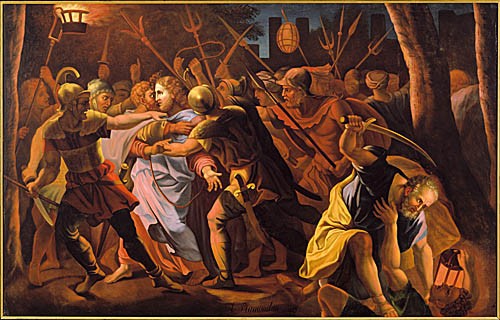It is always interesting to me, in my role as assistant professor of New Testament and Greek, to point out variations in translations to students while asking them why some translators make the decisions they make.

Angela Parker
And as someone who reads the biblical text along with the newspaper, I began pondering translation issues in John 18:12 while I was teaching a class on the Gospel of John recently. The New Revised Standard Version, English Standard Version and the New International Version translate John 18:12 respectively:
So the soldiers, their officer, and the Jewish police arrested Jesus and bound him. (NRSV)
So the band of soldiers and their captain and the officers of the Jews arrested Jesus and bound him. (ESV)
Then the detachment of soldiers with its commander and the Jewish officials arrested Jesus. And they bound him. (NIV)
In the midst of teaching vocabulary, morphology and syntax around the Greek text to my class on the Gospel of John, I ask my English-reading students to pay attention to how some translators make their choices in places like John 18:12. Often, interesting issues of translation and interpretation prompt an aware exegetical and homiletical student to ponder exactly how to preach a text to her parish.
In John 18:12, the Greek phrase that represents the highlighted words is οἱ ὑπηρέται τῶν Ἰουδαίων. The Greek word translated as “police,” “officers” or “officials” is the word ὑπηρέτης. In most renderings inside and outside of the New Testament texts, the word implies one who functions as a helper in some sort of subordinate capacity. In today’s parlance, a physician’s assistant may be an adequate representation of ὑπηρέτης. Other places that ὑπηρέτης appears include a representation of John Mark in Acts 13:5, along with the idea of the apostles as assistants to Christ in 1 Corinthians 4:1. What these various uses imply is that someone has been deputized by a superior in order to render some type of services.
“The picture the text wants us to understand is that an unnumbered group of helpers are assisting more than 600 soldiers in the arrest of Jesus.”
The interesting aspect of John 18:12 is that there is no concrete idea regarding the identity of who the Jewish “helpers” who arrested Jesus are. In the text, the Greek term for soldiers represents a Roman cohort of 600 men along with the one officer commanding those men. The “helpers” are simply identified as an undescribed number of “police,” “officials” or “officers” who are deputized to help locate Jesus through the betrayal of Judas along with those 600 soldiers. The picture the text wants us to understand is that an unnumbered group of helpers are assisting more than 600 soldiers in the arrest of Jesus.
Moreover, the term translated as “Jewish” or “of the Jews” (Ἰουδαίων) needs a bit of contextualization. The problem of anti-Semitic thought has been especially harmful in interpretations of the Gospel of John. The term hoi Ioudaioi appears more than 70 times in the Gospel of John. Mostly translated as “the Jews,” interpreters of the Gospel of John must always be alert to the hateful ways anti-Semitism has entered into biblical interpretation.
In the context of this opinion piece, I would argue that thinking through the idea of Jewish helpers is part of a responsible and contextual interpretation of these ideas today as one ponders the use of unidentified “secret police” or “armed vigilantes” in cities such as Portland, Ore., or Kenosha, Wisc., where Black Lives Matters peaceful protests against police brutality have occurred.
What is important to understand regarding “secret police” then versus “secret police” now is that there is an inherent binary thinking of “us” versus “them.” The issue that often requires detailed interpretation for the Gospel of John begs the questions about how Jewish “helpers” can attack or arrest their own Jewish identified folk.
While pondering this issue today, there must be nuance in a critically sound understanding of the relationships between Jewish helpers, early Jewish Jesus followers, and the Roman imperial forces that are all inhabiting the Palestinian land at the time of Jesus’s arrest. In essence, the Jewish helpers have aligned themselves with the Roman imperial militaristic authorities as they arrest Jesus. The “helpers” are assisting the Empire because not all Palestinian lives matter and some groups have been deputized by the Roman imperial authorities to arrest Jesus.
“The ‘helpers’ are assisting the Empire because not all Palestinian lives matter.”
Thinking through secret police as identified in news reports out of Portland or even thinking through armed vigilantism such as we have witnessed in Kenosha, critical readers of the biblical text must recognize that the “secret” police in Portland have been deputized by the acting director of the United States Department of Homeland Security (Chad Wolfe) who has not been confirmed by the proper channels within the United States Congress.
Moreover, Kyle Rittenhouse — a 17-year-old minor, driven to Kenosha from Illinois by his mother to “protect” property in Kenosha — allegedly shot and killed two Black Lives Matters white allies while also injuring a third. Rittenhouse has committed “white-on-white” crime even though I can imagine many bristling at such a characterization since many are used to the phrase “Black-on-Black” crime as an argument to espouse an idea that all Black folks are more prone to engage in criminal activity and, thus, become the target of policing in the United States.
What does all this mean? In my humble opinion, the idea of “secret police” is problematic both in the biblical text and in contemporary parlance. Part of our jobs as critically thinking Christians who read our sacred text for deeper engagement with Jesus as the Christ means that we must be aware of problematic issues in our text. If we are honest with ourselves, even as we see the problematic nature of “secret police” arresting Jesus in John 18:12, we can also see the problematic nature of a teenage vigilante deputizing himself to “protect” property and then kill two people and injure a third in the midst of this “protection.”
Why have self-identified Christians sent money to a teenage vigilante in order to defray his legal expenses as he has engaged in problematic policing? As an African American, Womanist New Testament scholar, that question has haunted me as I attempt to sleep at night.
Angela Parker serves as assistant professor of New Testament and Greek at Mercer University’s McAfee School of Theology. She earned a bachelor’s degree in religion and philosophy from Shaw University, a master of theological studies degree from Duke Divinity School and the Ph.D. in Bible, culture and hermeneutics from Chicago Theological Seminary.

